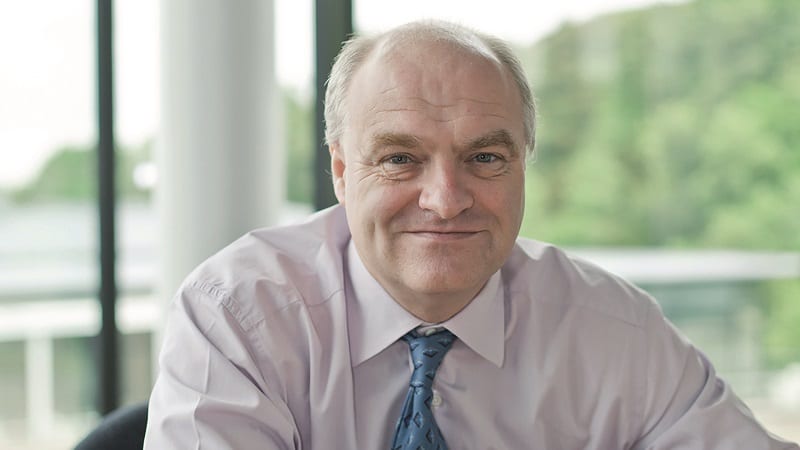Scottish Mortgage’s James Anderson and Tom Slater have argued the scale of their gargantuan £18bn trust is a “virtue rather than a hindrance” when it comes to accessing opportunities in private markets.
The trust’s size was a key talking point in an online presentation hosted by Anderson and Slater last week. Last year Scottish Mortgage’s share price surged 110% and assets have swelled to £18bn.
Reflecting on the trust’s rapid growth, Anderson (pictured) said its hefty size was a positive for investors.
“Our task isn’t primarily about any one year’s performance, or about growth versus value or the like. It is about trying to build our underlying competitive advantage. Scale becomes a virtue, rather than a hindrance. We have the abilities, connections and resources in a much greater way now, to be able to build that competitive advantage.”
Though the trust has rapidly ballooned in size, Slater dismissed suggestions that it would be trickier for Anderson and him to deploy capital and take sizeable stakes in private companies.
“If I’m a private company trying to raise capital, I would rather make a small number of phone calls, than a large number of phone calls,” Slater said. “And if there is a potential investor who can write the whole cheque rather than just contribute to the bill, then that is the phone call I will make first.”
Average manager would charge 2 and 20 at least for private companies exposure
Having greater scale has meant the pair are able to make private companies much more accessible to end investors, Anderson said.
“Given the scaling of Scottish Mortgage, well over half the assets were only being charged at a quarter of percent fees.
“Now if you think about it, we can have this substantial exposure to private companies which your average manager, and I mean average rather than a good one, would charge you 2 and 20 at least. That would cover the entire fee of Scottish Mortgage.”
Unquoted companies have become a much bigger proportion of Anderson and Slater’s holdings over time, ballooning from 4% in 2015 to 25% at the end of March 2020. That exposure can now go as high as 30% of NAV after shareholders approved changes to its investment policy at the trust’s AGM in June.
Shunning Silicon Valley for China
These days Anderson and Slater said they have been turning to China for investment ideas rather than Silicon Valley.
Slater said while there have been some “phenomenal companies that have grown out of the consumer internet” from the “cluster of innovation in the San Francisco Bay Area”, now some of the best disruptors were coming from China.
“What we’re seeing is a pipeline of new interesting businesses driven by founder managers operating at massive scale coming through from China,” he said.
According to data from Trustnet, around one fifth of the trust is held in Chinese equities. Three of Scottish Mortgage’s unquoted holdings are Chinese businesses, including its largest private holding, Ant Group (2.3%).
Slater said this is one of the reasons Baillie Gifford has been expanding its presence in the region, noting colleague Linda Lin’s efforts as head of investment research in Shanghai.
“Putting significantly more resource into that area and expanding the capability in terms of developing the pipeline and private companies, I think is another really important part of the puzzle about how do we get better at this point, how can we improve on what we’re doing,” he explained.
Chinese government clampdown ‘not as bad as you think’
The duo’s confidence in the region comes despite a government crackdown against Alibaba, which is one of the trust’s largest holdings at 4.8%, and subsidiary Ant Group.
In November, Chinese authorities halted Ant Group’s record breaking $37bn IPO in retaliation for criticisms lodged by founder Jack Ma against the country’s regulators and state-owned banks.
On Christmas Eve China’s regulator launched an anti-trust probe into Alibaba, a move which triggered a £150m tech sell-off, and Ma has seemingly disappeared from public life.
Anderson said media depictions of the regulatory situation in China had been over-egged, arguing the government’s current stance on competition in the e-commerce space was “in line with policies rather than dramatically different”.
“We do not think the overall operating conditions have deteriorated as drastically as the media would like you to believe,” he said.
“China is moving principally to a policy of greater anti-trust requirements in a way that actually I think would have been beneficial in America and Europe.
“Now none of that is to excuse aspects of the Chinese political scene, or the directions it’s gone, but I think from the operating conditions of the companies, it’s not as bad as you think,” he stressed.
Anderson and Slater skirt Tesla’s sky high valuation
Elsewhere, Anderson and Slater touched on another controversial holding – Tesla.
Though many commentators are warning Tesla’s valuation is in bubble territory, with shares up 800% in the last year, the Scottish Mortgage managers don’t see demand for electric car companies slumping anytime soon.
“What you’ve seen in 2020 is a massive change in the attitude of capital markets to the opportunity here,” Slater said, “and you’ve seen that in part in some of the share prices of the electric vehicle companies and Tesla.
“And it’s that access to capital that will really facilitate an acceleration and adoption of those types of products.”
See also: Baillie Gifford forced to clip back Tesla stake due to concentration rules
In addition to Tesla, Anderson and Slater also invest in Chinese electric car company Nio, which has seen its shares spike 1,318% in the last year. “Perhaps we should be asking Mr Musk, why they’re doing so badly,” Anderson quipped.
The pair stated they had also made a commitment to invest in Chargepoint, the world’s largest EV charging network, when it lists in the coming months.










